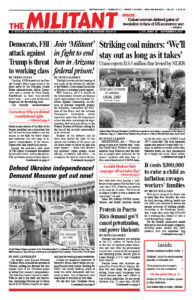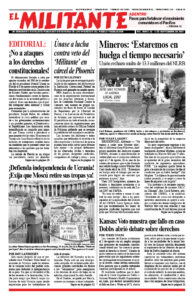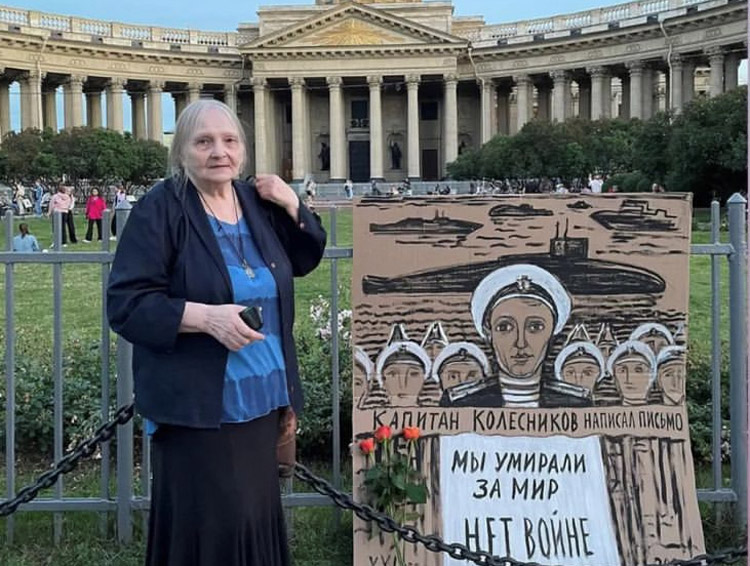Six months since Russian President Vladimir Putin launched his invasion of Ukraine, nothing has dimmed the courageous fight of the Ukrainian people to defend their country’s independence. The front lines haven’t moved in weeks. With no end to the death and destruction, demanding Moscow get its forces out of all of Ukraine remains an important fight for working people worldwide.
Despite the numerical superiority of Moscow’s forces, heavy losses are sapping Russian troop morale. Backing for Putin’s war among working people at home was never enthusiastic and continues to wane. Tens of thousands have been killed or wounded on both sides.
For the first time Ukrainian forces have mounted attacks against military targets inside Crimea, the Black Sea peninsula that Putin seized from Ukraine in 2014 and claimed as Russian territory. On Aug. 9, eight Russian fighter jets were blown up at the Saki air base. In the following days, an ammunition depot, power facilities and the headquarters of Russia’s Black Sea Fleet were also hit. These counterattacks are upending Moscow’s plans to launch an amphibious assault on the southern city of Odesa.
Moscow has been pressed to shift forces from the Donbas region in east Ukraine to the south in an effort to defend their occupation of Kherson and the Zaporizhzhia nuclear power plant.
Putin says Ukraine has no right to exist and its people are really Russian. In fact the Ukrainian people resisted centuries of national oppression by the Russian czars, winning independence after the Bolshevik-led 1917 Russian Revolution. Led by V.I. Lenin, the workers and farmers government that replaced capitalist rule overturned the czarist prison house of nations, championing the right to national self-determination.
Lenin led the founding of a voluntary federation of autonomous republics, including the modern territory of Ukraine, embracing Crimea and the Donbas. This led to a flowering of Ukrainian culture and art.
But a bloody counterrevolution headed by Joseph Stalin in the 1930s drove working people from political power and reimposed Moscow’s brutal authority over Ukraine and other Soviet Republics. By trampling on the national rights of long-oppressed peoples, the Stalinist regime ensured the eventual disintegration of the Soviet Union decades later in 1991.
Russian soldier: ‘Stop this madness’
Today the Kremlin is on a desperate recruitment drive to replace tens of thousands of casualties in its army, offering large amounts of money to “volunteers.” In Russian-occupied Donbas, Ukrainian miners and other workers are being forced to join Russian armed forces, the Kharkiv Human Rights Protection Group newsletter reports. There are no records of those killed, nor are their families being compensated. Women and pensioners have replaced 430 miners taken from the Dovzhanska-Kapitalna pit.
A scathing account of the war was posted online Aug. 1 by Pavel Filatyev, a Russian paratrooper deployed in Ukraine during the first weeks of the invasion. “My conscience tells me that I must try to stop this madness,” he wrote.
The Kremlin had no “moral right” to wage war against “another country, especially the people closest to us,” he says. Filatyev describes how he developed respect for Ukrainians’ courage to defend their country. His unit was marched from Crimea into Kherson. Troop morale plunged as Moscow’s occupation of that city ran into local opposition and then an attack on nearby Mykolaiv stalled.
Moscow’s high command turned soldiers “into absolute savages, ignoring the fact that they need to sleep, eat and take a shower,” he says. “This is an army that bullies its own.” Those who’ve gone through these experiences don’t want to “return there and die for something they don’t even understand.”
Filatyev describes the rusting equipment, lack of provisions and how he and other soldiers were reduced to looting occupied areas for food and clothes. The Kremlin “showered Ukraine with our corpses” and “some soldiers began to shoot themselves” in the leg to get sent home. Filatyev depicts anger in the army’s ranks toward Putin, the military command and “the Minister of Defense who did not serve in the army.”
He criticizes both Russian and Ukrainian government propaganda, saying it “further fuels hatreds in people.” When Ukrainian radio described Russian soldiers in abusive terms as “orcs,” it “embittered us more.” These comments and his damning condemnation of Moscow’s invasion point to the vital need for fraternization between Ukrainian and Russian working people, in and out of uniform, the only road to bring about an end to Putin’s war and restore Ukraine’s full independence.


